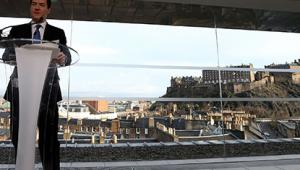By Richard Johnstone | 28 January 2014
A currency union between an independent Scotland and the rest of the UK would require agreements on public spending that would amount to a ‘ceding of national sovereignty’, the governor of the Bank of England has said.
In a speech in Edinburgh, Mark Carney also said there would need to be a ‘banking union’ between the two nations for a shared currency to be successful. If these ‘necessary foundations’ for a durable union where not in place, problems in the eurozone illustrated the ‘clear risks’ that result.
Carney said it would be for the Westminster and Scottish parliaments to determine if Scotland should retain Sterling following a ‘yes’ vote in the September independence referendum. The Bank of England would implement whatever monetary arrangements were put in place.
However, Carney said there were a number of key issues that needed to be addressed for an effective currency union between two independent nations. These included agreements on public spending.
‘[In] a monetary union between an independent Scotland and the rest of the UK the two parliaments would have to agree on whether fiscal rules were sufficient or whether similar risk-sharing mechanisms were necessary,’ he said.
Such a pact between Scotland and the remainder of the UK was needed as problems in one country were very likely to spill over to the other.
Carney also warned this could lead to a requirement for cross-border bailouts in a so-called Sterlingzone.
‘It will be in the interests of other countries in the union to bail out a country in crisis, and that reduces the incentives for countries to run their finances prudently in the first place,’ he said.
‘At a minimum, this “moral hazard” problem suggests the need for tight fiscal rules, to enforce prudent behaviour for all in the union, although credible sanctions for breaking those rules are hard to develop.’
Such rules on spending would effectively reduce an autonomous Scottish government’s independence, he added.
‘The euro area is now beginning to rectify its institutional shortcomings, but further, very significant steps must be taken to expand the sharing of risks and pooling of fiscal resources. In short, a durable, successful currency union requires some ceding of national sovereignty.
‘It is likely that similar institutional arrangements would be necessary to support a monetary union between an independent Scotland and the rest of the UK.’
Carney added that a banking union with common supervisory standards, access to central bank liquidity and lender-of-last-resort facilities would also be required.
‘Without a banking union, cross-border capital flows can be restricted, the effectiveness of monetary policy impaired and, in the extreme, the viability of the union itself undermined,’ he added.
‘An independent Scotland would need to consider carefully how to develop arrangements with the continuing United Kingdom that are both consistent with its sovereignty and sufficient to maintain financial stability.’
Responding to the speech, Scottish finance secretary John Swinney welcomed confirmation ‘that the independent Bank of England will implement whatever monetary arrangements are put in place by the two governments’.
But he added that the benefits of currency union were clear and would promote investment, eliminate transaction costs and facilitating movement of labour and capital.
Alistair Darling, who heads the Better Together campaign for a no vote, said Carney’s speech had ‘quietly demolished’ the case for a currency union.
‘There is one clear message from today’s thoughtful speech – that the failings of the eurozone show that to have a successful monetary union you require fiscal and political union.
‘[The] whole point of independence is to break the fiscal and political union that makes monetary union possible.’




















